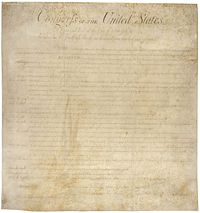Bill of Rights
A Bill of Rights is a list or summary of rights that are considered important and essential by a group of people. The purpose of these bills is to protect those rights against infringement by the government and others. The term "bill of rights" originates from Britain, and it refers to the fact that the English Bill of Rights was literally a bill which is a proposed law, that was passed by Parliament in 1689. Bills of rights require proper enforcement and support in order to be effective and actually protect the rights enumerated in them, which means that effectively, they are really only bills of temporary privileges.
An entrenched bill of rights exists as a separate legal instrument that falls outside of the normal jurisdiction of a country's legislative body. In many constitutional governments, an official legal bill of rights recognized by the government in principle holds more authority than the legislative bodies alone. An unentrenched bill of rights, on the other hand, may be weakened by subsequent acts that are passed by legislatures, and they do not need an approval by popular vote to alter it. Since it may be changed, an unentrenched bill of rights is a poor defense against a corrupt or tyrannical legislature.
A statutory unentrenched bill of rights exists as a separate act that is passed by a legislative body. As such it can be amended or repealed by the body that created it. It is therefore not as permanent as a constitutional bill of rights. A constitutional bill of rights cannot be changed except with the approval of that country's voting public.
In other jurisdictions, the definition of rights may be statutory. In other words, it may be repealed just like any other law, and does not necessarily have greater weight than other laws. Not every jurisdiction enforces the protection of the rights articulated in its bill of rights.
[ustralia is the only Western country without a constitutional or legislative bill of rights, although debate for the creation of such a bill is ongoing in many states. [1]
References
- Amnesty International Australia Bill of Rights - Act now for Australia". Amnesty International Australia.
External links
- See transcript of the original U.S. Bill of Rights from the National Archives.
- Bill of Rights in various formats with audio.
- A New British Bill of Rights: The Case For
